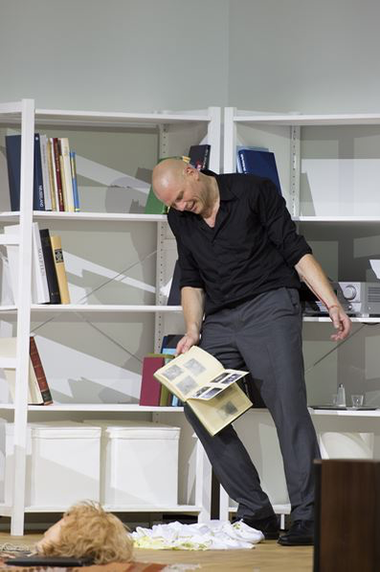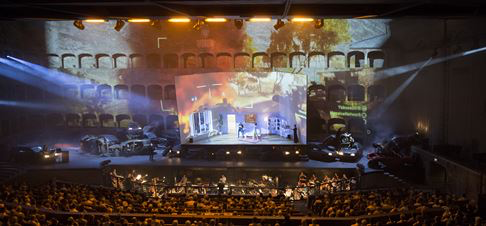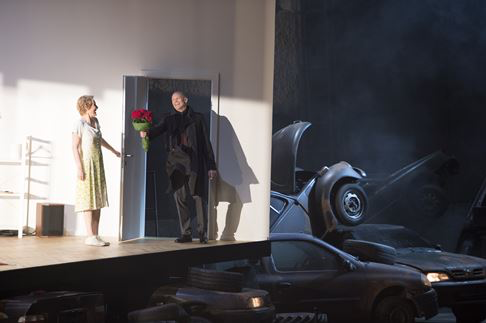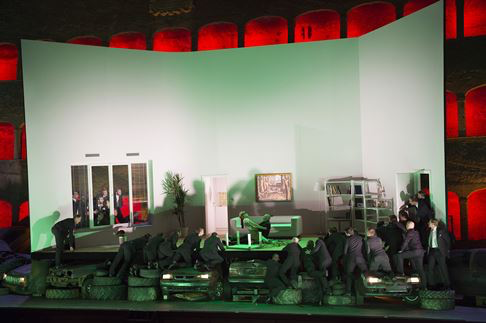Recently in Reviews
English Touring Opera are delighted to announce a season of lyric monodramas to tour nationally from October to December. The season features music for solo singer and piano by Argento, Britten, Tippett and Shostakovich with a bold and inventive approach to making opera during social distancing.
This tenth of ten Live from London concerts was in fact a recorded live performance from California. It was no less enjoyable for that, and it was also uplifting to learn that this wasn’t in fact the ‘last’ LfL event that we will be able to enjoy, courtesy of VOCES8 and their fellow vocal ensembles (more below …).
Ever since Wigmore Hall announced their superb series of autumn concerts, all streamed live and available free of charge, I’d been looking forward to this song recital by Ian Bostridge and Imogen Cooper.
The Sixteen continues its exploration of Henry Purcell’s Welcome Songs for Charles II. As with Robert King’s pioneering Purcell series begun over thirty years ago for Hyperion, Harry Christophers is recording two Welcome Songs per disc.
Although Stile Antico’s programme article for their Live from London recital introduced their selection from the many treasures of the English Renaissance in the context of the theological debates and upheavals of the Tudor and Elizabethan years, their performance was more evocative of private chamber music than of public liturgy.
In February this year, Albanian soprano Ermonela Jaho made a highly lauded debut recital at Wigmore Hall - a concert which both celebrated Opera Rara’s 50th anniversary and honoured the career of the Italian soprano Rosina Storchio (1872-1945), the star of verismo who created the title roles in Leoncavallo’s La bohème and Zazà, Mascagni’s Lodoletta and Puccini’s Madama Butterfly.
Evidently, face masks don’t stifle appreciative “Bravo!”s. And, reducing audience numbers doesn’t lower the volume of such acclamations. For, the audience at Wigmore Hall gave soprano Elizabeth Llewellyn and pianist Simon Lepper a greatly deserved warm reception and hearty response following this lunchtime recital of late-Romantic song.
Collapsology. Or, perhaps we should use the French word ‘Collapsologie’ because this is a transdisciplinary idea pretty much advocated by a series of French theorists - and apparently, mostly French theorists. It in essence focuses on the imminent collapse of modern society and all its layers - a series of escalating crises on a global scale: environmental, economic, geopolitical, governmental; the list is extensive.
For this week’s Live from London vocal recital we moved from the home of VOCES8, St Anne and St Agnes in the City of London, to Kings Place, where The Sixteen - who have been associate artists at the venue for some time - presented a programme of music and words bound together by the theme of ‘reflection’.
'Such is your divine Disposation that both you excellently understand, and royally entertaine the Exercise of Musicke.’
Amongst an avalanche of new Mahler recordings appearing at the moment (Das Lied von der Erde seems to be the most favoured, with three) this 1991 Mahler Second from the 2nd Kassel MahlerFest is one of the more interesting releases.
‘And there was war in heaven: Michael and his angels fought against the dragon; and the dragon fought and his angels, And prevailed not; neither was their place found any more in heaven … that old serpent … Satan, which deceiveth the whole world: he was cast out into the earth, and his angels were cast out with him.’
If there is one myth, it seems believed by some people today, that probably needs shattering it is that post-war recordings or performances of Wagner operas were always of exceptional quality. This 1949 Hamburg Tristan und Isolde is one of those recordings - though quite who is to blame for its many problems takes quite some unearthing.
There was never any doubt that the fifth of the twelve Met Stars Live in Concert broadcasts was going to be a palpably intense and vivid event, as well as a musically stunning and theatrically enervating experience.
‘Love’ was the theme for this Live from London performance by Apollo5. Given the complexity and diversity of that human emotion, and Apollo5’s reputation for versatility and diverse repertoire, ranging from Renaissance choral music to jazz, from contemporary classical works to popular song, it was no surprise that their programme spanned 500 years and several musical styles.
The Academy of St Martin in the Fields have titled their autumn series of eight concerts - which are taking place at 5pm and 7.30pm on two Saturdays each month at their home venue in Trafalgar Square, and being filmed for streaming the following Thursday - ‘re:connect’.
The London Symphony Orchestra opened their Autumn 2020 season with a homage to Oliver Knussen, who died at the age of 66 in July 2018. The programme traced a national musical lineage through the twentieth century, from Britten to Knussen, on to Mark-Anthony Turnage, and entwining the LSO and Rattle too.
With the Live from London digital vocal festival entering the second half of the series, the festival’s host, VOCES8, returned to their home at St Annes and St Agnes in the City of London to present a sequence of ‘Choral Dances’ - vocal music inspired by dance, embracing diverse genres from the Renaissance madrigal to swing jazz.
Just a few unison string wriggles from the opening of Mozart’s overture to Le nozze di Figaro are enough to make any opera-lover perch on the edge of their seat, in excited anticipation of the drama in music to come, so there could be no other curtain-raiser for this Gala Concert at the Royal Opera House, the latest instalment from ‘their House’ to ‘our houses’.
"Before the ending of the day, creator of all things, we pray that, with your accustomed mercy, you may watch over us."
Reviews

08 Aug 2015
Die Eroberung von Mexico in Salzburg
That’s The Conquest of Mexico, an historical music drama composed in 1991 by German composer Wolfgang Rihm (b. 1952). But wait. Wolfgang Rihm construed a few sentences of Artaud’s La Conquête du Mexique (1932) mixed up with bits of Aztec chant and bits of poem(s) by Mexico’s Octavio Paz (d. 1998) to make a libretto.
Like Nobel Prize winning (1991) poet Octavio Paz composer Wolfgang Rihm is at once a neo-modernist, a surrealist, an existentialist and an esotericist both as a composer and a librettist/poet. More than likely he and his collaborator for this production, stage director Peter Konwitschny are not like Artaud who discovered and devoured peyote during the year he lived in Mexico. There is no way a creation like The Conquest of Mexico with its complexities of concept, of sound and of staging could have been realized without absolute clarity of intellect and solidity of purpose. It was an evening of cold calculation.
What messieurs Rihm and Konwitschny do share with Antonin Artaud is cruelty. It was an unpleasant sometimes disgusting, too long evening that forced you to admire the resources of theater and the skill of execution, an evening that transported you finally to a plain of existential comprehension, this a place you would never dare attempt on your own — too scary. And this was the pleasure perpetrated by the opera, and this pleasure was finally enormous.
 The back wall is the arcades of the Felsenreitschule (Summer Riding School) carved into the Salzburg mountainside that is now part of one of the three adjacent theaters of the Salzburg Festival, plus the wrecked cars and apartment of the production.
The back wall is the arcades of the Felsenreitschule (Summer Riding School) carved into the Salzburg mountainside that is now part of one of the three adjacent theaters of the Salzburg Festival, plus the wrecked cars and apartment of the production.
The Conquest of Mexico is a star vehicle for baritone if ever there was one. In this case it was Bo Skovhus who was Cortez, or in Artaud parlance the male principle. His inherent masculinity was blatant, this is not at all a personal compliment. He climbed through a massive pile of dirty wrecked cars (evidently Mr. Konwitschny’s male principle metaphor) to arrive at a sterile box with a window and a sofa and a door to a kitchen (Mr. Konwitschny’s female principle metaphor to represent Mr. Rihm’s idea of the new world — an opposite world). Montezuma was sung by soprano Angela Denoke whose blond presence was difficult and calculating. It was either rape or it was not but finally it was, the issue of copulation was the neuter world of computer games.
 Angela Denoke as Montezuma, Bo Skovhus as Cortez
Angela Denoke as Montezuma, Bo Skovhus as Cortez
Before all festival performances the audience gathers in front of the festival theaters for one last aperitif before the performance. Any performance at the festival is a dressy event but you did notice more than the usual number of men in tuxedos, unusually they were young men (the festival audience is mature). Well, at a certain moment (intense noise) these thirty-one young guys rushed down through the audience, clamored onto and over the wrecked cars and finally crashed onto the stage where they provoked a beer blast, cheered on first male oral sex then the ugly rape, and finally slobbered over six scantily clad mädchen and a shinny red Porsche.
 The tuxedo dressed Spanish soldiers
The tuxedo dressed Spanish soldiers
Bo Skovhus killed Angela Denoke (it was that real), then killed himself (in fact this was a very moving, extended scene). But Mr. Skovhus and Mme. Denoke aka Cortez and Montezuma did come together posthumously. They were seated side by side but not touching to sing the a cappella duet that ends the opera, It was the full exposition of Artaud’s neuter.
Did I get all this right?
There was a sizable ensemble of lower voiced instruments in the pit (violas and cellos, bass clarinet, contrabassoon, harp, piano and lots of tom-tom drums, etc. There was a primary conductor, Ingo Metzmacher, plus a second conductor who seemed to be only interested in the stage. There were two far-away orchestras of percussion instruments and brass instruments and a violin seated on an old truck-tire on each side of the wide stage. It was loud, very loud, then louder with a huge compliment of microphones and speakers. It was ugly music. It was meant to be.
In the pit as well were two male Speakers who spent the first part of the evening sitting in the pit making various weird noises with there voices, and a soprano seated in the pit house left who sang very high, freakish notes from time to time, and in the pit on house right a mezzo-soprano sang very low notes from time to time. And from time to time these four singers climbed out of the pit onto the stage, and climbed over piles of tires and wrecked cars to help out Cortez and Montezuma on the stage.
It was a fun evening.
For a formal exposition of the genesis of this work go to the Salzburg Festival website About this production .
Michael Milenski
Cast and production information:
Montezuma: Angela Denoke; Cortez: Bo Skovhus; Soprano: Susanna Andersson; Mezzo-soprano: Marie-Ange Todorovitch; Speaker 1: Stephan Rehm; Speaker 2: Peter Pruchniewitz. ORF Radio-Symphonieorchester Wien. Conductor: Ingo Metzmacher; Stage Director: Peter Konwitschny; Sets and Costumes: Johannes Leiacker; Lighting: Manfred Voss; Video Design: fettFilm; Sound Design: Peter Böhm and Florian Bogner. Felsenreitschule Theater, Salzburg, August 1, 2015.



